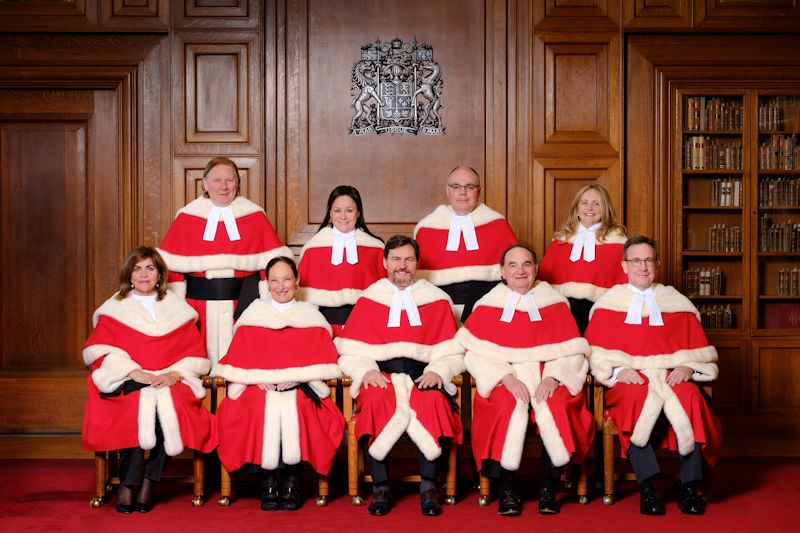They see you when you’re sleeping, they know when you’re awake. They’re ready to decide if you’ve been unjustly enriched, so be good for goodness sake. The Supreme Court of Canada is coming to town.

The Supreme Court of Canada in their festive/ceremonial robes
[Not pictured – Santa Claus]
On November 23rd, the Supreme Court of Canada released its decision in Moore v. Sweet, 2018 SCC 52. Back when this case was at the Ontario Court of Appeal, an interesting summary was posted on this blog – A Curious Case of “Just” Enrichment. The author signed off that post by saying it would be a strong candidate for further appeal. With that said, the Supreme Court donned its ceremonial robes and asked the appellant, Michelle Moore, what she wanted for Christmas this year.
Lawrence and Michelle Moore separated in 1999 and created an oral contract that Michelle would remain the sole beneficiary of Lawrence’s life insurance policy, if she continued to pay the premiums. Less than a year later, Lawrence changed the beneficiary designation to his new common-law spouse, Risa Sweet. Unaware of the change, Michelle continued to pay the premiums until Lawrence passed away in 2013.
As a background, the test for unjust enrichment has three elements:
(1) an enrichment of the defendant
(2) a corresponding deprivation of the plaintiff
(3) an absence of juristic reason for the enrichment
A key focus for the Court in this case was the ‘juristic reason’ aspect of the test. When Lawrence named Sweet as beneficiary, this new designation was made irrevocably, as permitted by Ontario’s Insurance Act. An irrevocable beneficiary designation means that it cannot be revoked or changed without the consent of the named beneficiary.
At the trial court, the proceeds of the life insurance policy (about $250,000) were awarded to Michelle on the basis of unjust enrichment. This decision was reversed at the Ontario Court of Appeal, which ruled that she was only entitled to the return of the $7,000 in premiums she had paid.
The Supreme Court decided 7-2 that the trial court was correct, and that Michelle was entitled to the full proceeds of the policy, stating that “The measure of deprivation is not limited to the plaintiff’s out‑of‑pocket expenditures or to the benefit taken directly from him or her”.
In deciding whether there was a juristic reason for the enrichment, the Court held that:
“Nothing in the Insurance Act can be read as ousting the common law or equitable rights that persons other than the designated beneficiary may have in policy proceeds. The legislature is presumed not to depart from prevailing law without expressing its intention to do so with irresistible clearness. While the Insurance Act provides the mechanism by which beneficiaries become statutorily entitled to receive policy proceeds, no part of the Act operates with the necessary irresistible clearness to preclude the existence of contractual or equitable rights in those proceeds once they have been paid to the named beneficiary.”
It will be interesting to see how this case and the concept of “irresistible clearness” will be applied in future litigation. Insurance legislation in Canada preserves the rights of beneficiaries by protecting insurance proceeds from creditors. Will it be easy to make a distinction between a “creditor” and someone who has “contractual or equitable rights”? Will this case act as an effective precedent for unjust enrichment claims in general?
When it comes to unjust enrichment, it’s always best to check your lists twice.

1 Comment
Gurpreet
December 7, 2018 - 3:36 pmI really enjoy reading your blogs. Merry Christmas and Happy New Year.